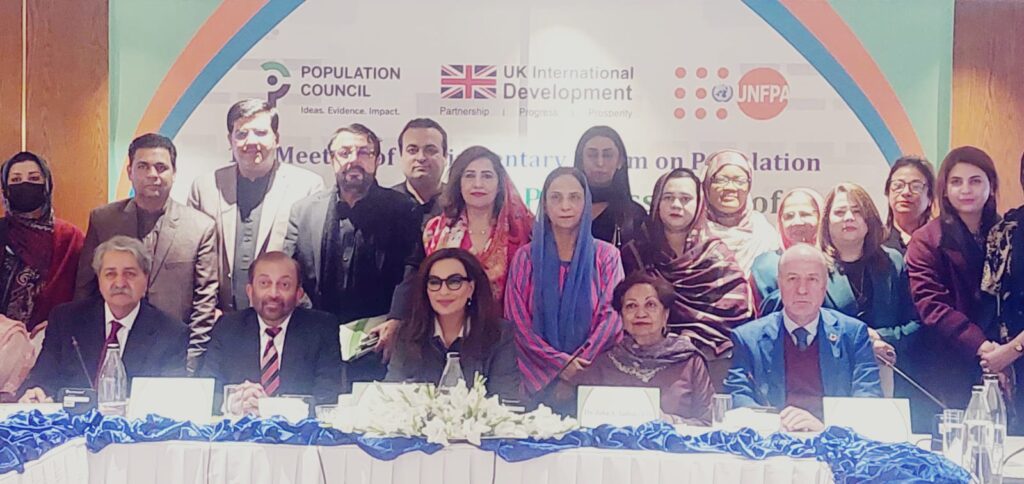
Islamabad : Chairing the 12th Meeting of Parliamentary Forum on Population organised by Population Council and UNFPA, Senator Sherry Rehman called for a unified national approach to tackle Pakistan’s accelerating population growth crisis. Drawing on insights from the UNFPA and Population Council’s landmark study, “Pakistan @ 2050”, Senator Rehman emphasized that population growth is a “ticking time bomb” and urged policymakers, legislators, and all stakeholders to collaborate for a path forward that puts Pakistan on a sustainable trajectory.
“Population growth is not just a resource issue; it is a structural issue with far-reaching impacts on health, education, and economic stability,” said Senator Sherry Rehman. “The numbers don’t lie. If we bring down fertility rates as recommended by the Council of Common Interests (CCI) to 2.1 births per woman by 2030, per capita income could increase by 37%, and GDP growth could rise to 3.9% by 2033.”
Addressing misconceptions, Senator Rehman stated, “It’s easy to blame resource scarcity, but at its core, this is not just a resource issue. It is about rights, empowerment, and decision-making at the family, community, and national levels.”
Senator Rehman noted that while some may see population growth as a potential “demographic dividend,” for Pakistan, it has become a demographic burden. The country’s fertility rate of 3.6 births per woman remains one of the highest in South Asia.
She stressed, “This burden is impacting every aspect of society, from health and education to economic growth and climate resilience. There is a massive structural impact on everything related to population – from dwindling national resources to the pressure on social services. Every national resource is stretched thin, impacting not just the economy but also individual lives.”
“Pakistan is on the front line of climate change, and population pressures are aggravating this crisis. We cannot sustain this growth rate and hope to provide essential services like education and healthcare to our citizens,” she stated.
Stressing the impact of climate change, she added that “a 1-degree Celsius increase in temperature can reduce household income by 4%, which further impacts livelihoods, poverty, and overall economic growth.” Senator Rehman underscored that climate change and population growth are inextricably linked, with poorer and more vulnerable communities bearing the brunt of these twin challenges.
Senator Rehman called for legal reforms, particularly emphasizing the role of legislation on the age of marriage. “Sindh has set the standard by raising the age of marriage to 18 under the Child Marriage Restraint Act,” she remarked. “I introduced a similar law for Islamabad Capital Territory (ICT) four years ago, but unfortunately, it has still not been passed by the National Assembly. This is a crucial step in allowing women to make informed decisions about their health and family planning.”
Underscoring the role of women in family planning, she stated, “When a woman has agency to make choices about the timing and spacing of her pregnancies, it leads to healthier families and a stronger society.” She also urged public leadership at both the provincial and federal levels to place their political weight behind this discussion to ensure swift action.
The Lady Health Worker (LHW) Program, launched by former Prime Minister Shaheed Benazir Bhutto in 1994 is a transformative model for reducing fertility rates. Senator Rehman applauded its past success and its recognition by the World Bank as a ‘gold standard’ for service delivery.
“LHWs went directly into family homes, spoke to decision-makers, and addressed the cultural sensitivities around contraception,” Senator Rehman noted. “They brought ulema (religious scholars) on board and engaged communities in ways that were non-intrusive but effective. This was a game-changer.”
She emphasized that the role of women in family planning must be central, and while men can be mobilizers, “women themselves must be empowered to make decisions about their own health.” She called for the LHW model to be scaled up and reintroduced with renewed political and financial support.
“According to a report by WHO, every 2 minutes, a woman loses her life in Pakistan due to childbirth or pregnancy-related complications. This is unacceptable in any society,” Senator Rehman remarked. She called for renewed public messaging campaigns similar to the past ad campaigns for LHWs, which emphasized non-intrusive, family-friendly approaches to contraceptive use.
Senator Rehman emphasized the importance of involving every province, noting that cross-provincial coordination was essential. “We can certainly facilitate discussions at the provincial level to ensure this issue gets the priority it deserves,” she stated.
She also called for continued engagement with the Council of Islamic Ideology (CII), citing past instances where the CII supported family planning initiatives. “We have precedent where the CII has supported these discussions, and this is an opportunity to once again align religious and social priorities,” she noted.
The forum called for action at all levels, from legislation to public advocacy, urging policymakers to take ownership of the issue. “Every platform must be used to raise awareness and bring about joint action,” Senator Rehman emphasized. “This is not a challenge that one party, one province, or one institution can solve alone. This requires a whole-of-society approach with strong public leadership.”
Concluding the meeting, Senator Rehman expressed appreciation for the commitment shown by stakeholders around the table and called on policymakers to turn discussions into tangible action. “This is not a hypothetical debate,” she said. “This is a real-time crisis. We know the solutions, we have seen the evidence, and now we must act.”
She reiterated that “service delivery will be the tipping point” and that empowering women to make decisions about their health and family planning would be key. “Public leadership from both the provincial and federal levels must step forward with courage and commitment,” she concluded.
The Population Council’s “Pakistan @ 2050” report serves as a roadmap for Pakistan’s future, with evidence-based solutions that, if implemented, could steer the country toward sustainable development. Senator Sherry Rehman emphasized that with the right political will and action, Pakistan could shift from a future of resource scarcity to one of shared prosperity.